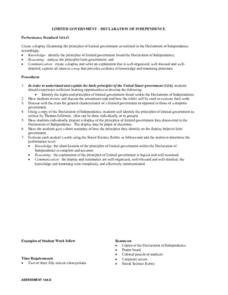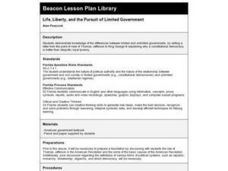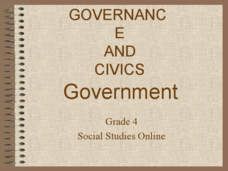iCivics
Limiting Government
While this instructional activity includes several nice worksheets to identify and discuss the various limits on government (i.e. a constitution, the rule of law, separation of powers, consent of the governed, etc.), its main value lies...
Student Handouts
Constitutional Principles
Keep track of constitutional principles with a graphic organizer. Pupils define, describe the origins of, and note down the location of the following terms: checks and balances, federalism, individual rights, limited government, popular...
Curated OER
Limited Government: Declaration of Independence
Students study the limited government within the Declaration of Independence. They discuss the characteristics of a limited government in contrast to a despotic government. They identify principles of the limited government within the...
Curated OER
Why Do We Need Limited Government?
Students study how limited government protects individual rights and identify the limits that are placed on US authorities. They investigate the meaning of discrimination and individual rights as they complete the attached worksheet.
Curated OER
American Government
Challenge your students with this activity on American government! Learners discuss the three branches of government and its responsilbities, and then go on to more complex critical-thinking activities. Students interview members of the...
Curated OER
Life, Liberty, and the Pursuit of Limited Government
Students write a letter to King George III from the point of view of Thomas Jefferson. They defend constitutional democracy and explain the differences between limited and unlimited government.
Curated OER
Governance And Civics: Grade 4
This PowerPoint provides elementary students with a basic overview of the structure and workings of the US Government. Students will be introduced to the 3 branches of Federal and State Government, the Bill of Rights, and Amendments 1,...
School Improvement in Maryland
Dividing the Powers of Government
Who does what? To develop an understanding of the balance of power between the US federal and state governments, class members research responsibilities in terms of legal systems, security issues, economic activities, lawmaking, and...
Curated OER
What Experiences Shaped the Founders' Thinking about Government?
Students study the ideas and experiences that shaped the founding fathers' perspective about government. In this the government lesson plan, students examine the Articles of Confederation as they relate to the power of government....
National Constitution Center
Separation of Powers
Learners explore how the Constitution provides for separation of power and limited government, as evidenced by the three branches of government. They participate in role-playing situations, group discussions, and complete worksheets to...
Curated OER
Branches of Government
After reading a short text on the branches of government in the United States, future voters answer 8 fill-in-the-blank questions, as well as 11 true or false questions. This worksheet would be a great homework assignment or silent...
Curated OER
Forms of Government: Ch 1
Assist your class by clarifying aspect of various forms of government. This resource contains 5 true/false and 5 multiple choice questions.
Curated OER
Cartoons for the Classroom: Drawing Attention to Government Secrecy
How much do we know about our government? This engaging topic for teens is made especially interesting through analysis of 2 political cartoons. Background information on Sunshine Week makes the cartoons more accessible, and 3 talking...
Council for Economic Education
Government Spending: Why Do We Spend the Way We Do?
Students examine the categories for federal spending using the internet to locate them. They create a list of expenditures noting them as government purchases or transfer payments. They analyze the patterns of spending during the past 40...
Curated OER
Government Lesson Plan: Lesson Plan 2
Students explore the structure and powers of the federal government. They assess the validity of recent criticisms of each branch of the federal government and create pyramid posters which simulate the structure of government.
Curated OER
Government Lesson Plan: Lesson Plan 12
Students investigate various political systems around the world. They complete a chart that compares the U.S. political system with other nations' governments, conduct research on a selected nation, and present an oral report.
Curated OER
Executive Government: Executive Decision Making
Students make executive decisions. In this Social Studies lesson, students explore the concept of executive decisions through a game of chess. Students role play a year-level formal plan and implementation.
College Board
Civic Knowledge and Action in AP U.S. Government and Politics
Vote, it's your civic duty! The high school lesson focuses on voter turnout and civic participation with a series of activities. Young scholars analyze data to discover voter turnout trends, complete worksheets, and participate in group...
Curated OER
Why Do Governments Exist? Locke, Hobbes, Montesquieu, and Rousseau
Here is a great secondary source reading that includes the primary ideas and philosophies of the famed Enlightenment philosophers: Thomas Hobbes, John Locke, Charles Montesquieu, and Jean-Jacques Rousseau. In additional to discussing...
School Improvement in Maryland
Socio-Economic Goals of the Government
Equity. Increased productivity. Price stability. Environmental protection. Decreased poverty. Governments establish socio-economic goals and then must design and fund programs to address these goals. Groups investigate various programs...
Curated OER
Understanding the Debt Ceiling Debate and the Budget Control Act of 2011
Upper graders listen to a podcast on the EconTalk website featuring economist Keith Hennessey. The podcast focuses on the Budget Control Act of 2011, the national debt, and government spending. They read specifics about the BCA, then...
Curated OER
Powers of Congress
Have your class fill out this comprehension sheet while reading about the powers of Congress. There are ten multiple choice questions focused on the rights, powers, and limitations of Congressional law.
Federal Reserve Bank
Choices Are Everywhere: Why Can’t We Just Have It All?
Here is a resource covering a range of terms and concepts regarding scarcity, opportunity cost, and government debt in economics.
Curated OER
Government Lesson Plan - Number 14
Students analyze data on air pollution in Maryland. They evaluate the effectiveness of government actions to improve air quality. Each group recommends actions that would improve air quality on the federal, state and local level.

























